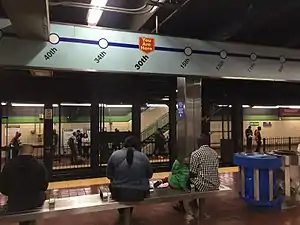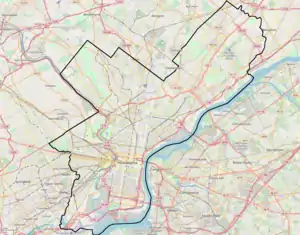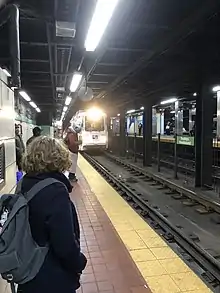30th Street station (SEPTA subway)
30th Street station is an underground SEPTA rapid transit and trolley station in Philadelphia. It is located on Market Street between 30th and 31st Streets in the University City neighborhood, adjacent to 30th Street Station and Drexel University. The station features four tracks – the inner pair serving the Market–Frankford Line and the outer pair for subway–surface trolleys.
30th Street | ||||||||||||||||
|---|---|---|---|---|---|---|---|---|---|---|---|---|---|---|---|---|
 30th Street station Market–Frankford line platform | ||||||||||||||||
| General information | ||||||||||||||||
| Location | 30th and Market Streets Philadelphia, Pennsylvania | |||||||||||||||
| Coordinates | 39°57′18″N 75°11′01″W | |||||||||||||||
| Owned by | Southeastern Pennsylvania Transportation Authority | |||||||||||||||
| Platforms |
| |||||||||||||||
| Tracks | 4 | |||||||||||||||
| Connections |
| |||||||||||||||
| Construction | ||||||||||||||||
| Structure type | Underground | |||||||||||||||
| Accessible |
| |||||||||||||||
| History | ||||||||||||||||
| Opened | November 6, 1955[1] | |||||||||||||||
| Services | ||||||||||||||||
| ||||||||||||||||
| ||||||||||||||||
| Location | ||||||||||||||||
 30th Street Location within Philadelphia | ||||||||||||||||
History

30th Street station opened on November 6, 1955 by the Philadelphia Transportation Company (PTC),[2] built as a replacement for the elevated 32nd Street station that had opened in 1907 as part of the Philadelphia Rapid Transit Company's original Market Street subway–elevated line from 69th Street T.C. to 15th Street, which was elevated west of 23rd Street.[3][1]
The PRT announced a project to bury the elevated tracks between 23rd to 46th streets in the 1920s.[4] The tunnel from 23rd to 32nd streets was completed by 1933, but construction on the remaining segment was put on hiatus due to the Great Depression and World War II.[4] The PRT went bankrupt in 1939 and was reorganized as the PTC,[5] which began building the rest of the tunnel in 1947.[4]
The underground station is half a block southwest of 30th Street Station, the city's main intercity rail and commuter rail station. A tunnel previously connected the two stations, but was closed in the 1980s, reportedly due to safety concerns. Amtrak and SEPTA considered reopening the tunnel in the early 2000s, but the September 11 attacks ended those plans.[6]
In December 2018, SEPTA received a $15 million grant from the United States Department of Transportation to make significant improvements to the station.[7][8] The improvement project was projected to cost over $37 million, with remaining funds contributed by SEPTA's capital budget and the developer Brandywine Realty Trust,[7] which owns 3000-3020 Market Street directly above the subway station[9] and is planning the Schuylkill Yards megaproject. The project calls for improvements to the station's mezzanine, as well as reopening and renovating the underground concourse connecting the subway station with the main 30th Street Station building.[7] A second access point to the station at the corner of 31st and Market streets reopened in late 2019, which includes a staircase and new elevator.[10] The full project was expected to be completed in 2021, but as of July 2023, is ongoing.[8]
The 30th Street Station District, a proposed development plan, calls for the station house at the northwest corner of 30th and Market streets to be rebuilt.[11]
Station layout
The station has a high-level island platform for Market–Frankford trains and two low-level side platforms for subway–surface trolleys.
| G | Street level | Entrances/Exits, buses, 30th Street Station |
| M | Mezzanine | Fare control, connection between platforms |
| P Platform level |
Side platform, doors open on the right | |
| Westbound | ← Subway–surface trolley lines toward West Philadelphia (33rd Street) | |
| Westbound | ← Market–Frankford Line toward 69th Street T.C. (34th Street) | |
| Island platform, doors open on the left | ||
| Eastbound | Market–Frankford Line toward Frankford T.C. (15th Street) → | |
| Eastbound | Subway–surface trolley lines toward 13th Street (22nd Street) → | |
| Side platform, doors open on the right | ||
Bus connections
In addition to rail services at 30th Street Station, the station is also served by numerous bus routes, including routes 9, 30, 31, 44, 49, 62, and LUCY operated by the SEPTA City Transit Division, as well as routes 124 and 125 operated by the SEPTA Suburban Division.
Image gallery
 Market–Frankford line platform
Market–Frankford line platform Free transfer zone in 30th Street station
Free transfer zone in 30th Street station 30th Street Trolley station
30th Street Trolley station 30th Street trolley station
30th Street trolley station Former 30th Street station entrance - this entrance is being renovated as part of the 30th Street Station District project.
Former 30th Street station entrance - this entrance is being renovated as part of the 30th Street Station District project..jpg.webp) Trolley car at inbound platform
Trolley car at inbound platform
References
- John Hepp (2013). "Subways and Elevated Lines". Encyclopedia of Greater Philadelphia. Retrieved May 31, 2020.
- Cox, Harold E. (1967). May, Jack (ed.). The Road from Upper Darby. The Story of the Market Street Subway-Elevated. New York, NY: Electric Railroaders' Association. p. 32. OCLC 54770701.
- Springirth, Kenneth C. (2016). Philadelphia Electrified Rail Lines In Color. Scotch Plains, New Jersey: Morning Sun Books Inc. ISBN 978-1-5824-8498-3.
- John L. Puckett. "Putting the Market Street Elevated Underground". West Philadelphia Collaborative History. University of Pennsylvania Graduate School of Education. Retrieved June 2, 2020.
- "Studio 34's Eponymous Trolley, or, A Short History of Route 34". Archived from the original on 2013-12-09. Retrieved 2008-12-20.
- Saffron, Inga (March 7, 2003). "Archive: Subway riders get shortchanged at 30th St. Station". The Philadelphia Inquirer. Retrieved May 31, 2020.
- Tanenbaum, Michael (10 December 2018). "SEPTA awarded $15 million grant for subway improvements at 30th Street Station". PhillyVoice. Retrieved 30 January 2020.
- Merriman, Anna (December 7, 2018). "With federal grant, SEPTA plans $37M subway improvement project". Curbed. Retrieved May 31, 2020.
- "Our Properties". Brandywine Realty Trust. Retrieved May 31, 2020.
- "Current Projects". Philadelphia 30th Street Station District. Retrieved 30 January 2020.
- "30th Street Station West Underground Concourse" (PDF). 30th Street Station District. March 27, 2018. Retrieved May 31, 2020.